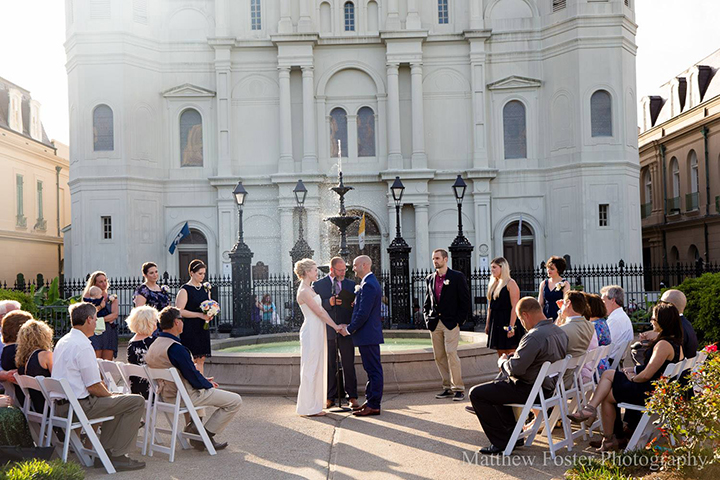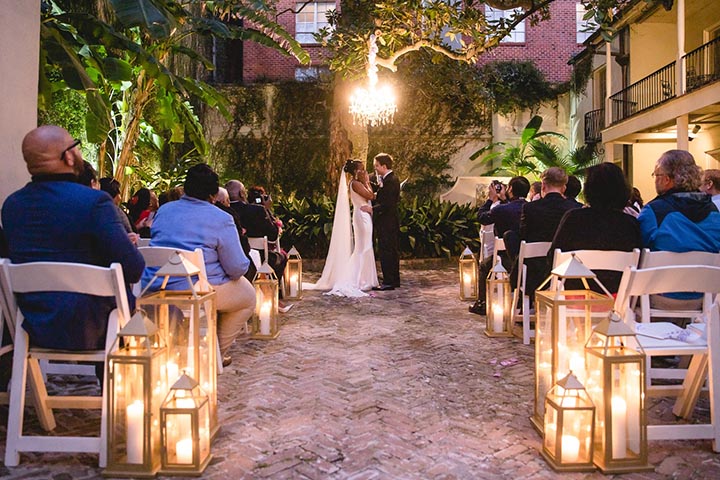It has been a difficult spring for engaged couples and caterers alike. In response to COVID-19, thousands of couples have had to either postpone or cancel the weddings they had spent months, and in some cases years, planning. Caterers saw countless events evaporate off of their books, in turn losing hundreds of thousands of dollars—sometimes millions—in the course of an afternoon. “I got on the plane in Vegas after Catersource,” said Ronnie Davis of New York City’s Great Performances, “and by the time I landed, I’d lost $5 million in bookings.”
According to Shane McMurray, CEO, The Wedding Report, approximately 28 percent of nuptial couples opted to postpone until later in 2020, while 22.5 percent are moving to 2021. As the world slowly begins to recover, businesses have reopened, events are being rescheduled, and wedding season is once again coming up—just a few months late.
Join Catersource on June 26 for the Rebuild & Rise Webinar "Can Buffets Survive COVID?" Learn more and register by clicking here.
It won’t be back to business as usual, however. Many of the couples who had to postpone their weddings may be looking for an expedited timeline, or exploring ways to lower their expenses, for myriad reasons. It is also still unknown what kind of requirements for group gatherings will unfold, state by state. Enter: the micro wedding.
“I think we will start to see more micro weddings because it was a trend that was already growing in popularity, but now might become even more popular out of necessity and restrictions on guest size and travel,” said Emily Sullivan, owner of Intimate Events by Emily in New Orleans, La.
Defining micro
Micro weddings are not a jet to Las Vegas and an Elvis-style officiant. Whereas an elopement implies spontaneity, the micro wedding contains all the elements of a traditional ceremony and reception, just on a much smaller scale. Traditionally, micro weddings consist of fewer than 50 guests, with an average guest list of 25 to 30.
“It’s about focusing on the people who you love and really care about you,” Sullivan said. “These experiences have all the bells and whistles of a larger scale wedding, but the couple gets to interact with each guest. They don’t necessarily have to spend time ‘catching up’ since these are their ‘people.’”
Keep it inexpensive
The average cost of a wedding is around $34,000, and that price tag may seem daunting for couples who have experienced furlough or job loss. With a micro wedding, couples are still able to have the beautiful details of a traditional wedding, but at a quarter of the cost.
“You can make your money go further with less guests,” Sullivan noted.

A micro wedding is not an elopement. Whereas an elopement implies spontaneity, the micro wedding contains all the elements of a traditional ceremony and reception, just on a much smaller scale. Photo courtesy Matthew Foster Photography
There are a number of venues that already have a micro wedding package. Zingerman’s Cornman Farms in Michigan offers a $2,000 micro wedding package that includes a one-and-a-half-hour venue rental, photographer (who provides 45 digital images), officiant, flowers, small cake, and a sparkling wine toast. Storybrook Farm Weddings in Jonesborough, Tenn. also offers a micro wedding package. For $4,000, couples can enjoy a 16-guest wedding that includes everything you’d expect in a traditional wedding. Philadelphia’s Kimpton Hotel has several packages to choose from, starting at $1,250 and include the ceremony, the officiant, music, wedding cake, and champagne toast for up to 30 people.
Keep it simple
On average, the time it takes to plan a micro wedding averages about six months, but because of the shortened timeline it’s also important to keep the options simple. When discussing options with clients make sure to keep it basic—basic food, basic cake, basic flowers.
For Sullivan, her micro, or intimate, wedding packages include:
- A 20-minute ceremony
- Officiant
- Ceremony musician
- Customized bridal bouquet and groom’s boutonniere
- Four hours of professional photography coverage
- 2 tier wedding cake
- Three-hour DJ/jazz band for reception
- Hotel block management and honeymoon suite
- Wedding day coordination
- Customized food choices, including passed hors d’oeuvres, a variety of reception stations, or a seated dinner
- Tables and chairs
- Open bar options for length of three-hour reception
Each of the micro weddings that Sullivan plans can be customized based on what the couple wants.
“It depends on the venue and guest count so it’s hard to narrow down pricing in general,” she said.

Micro weddings consist of fewer than 50 guests, while still including all of the elements of a traditional wedding. Photo courtesy of Matthew Foster Photography
While customization may be the route for some couples, it’s also important to keep it simple for yourself when deciding which outside vendors you want tofold into your micro wedding packages.
“It’s important to not overthink it,” Sullivan said. “We do this all the time for large events, so smaller events should be a snap.”
Keep it lucrative
You may wonder how micro weddings can be lucrative given the smaller price point. Micro weddings won’t completely replace traditional large-scale weddings, but they will most likely offer an additional revenue steam.
“It’s important to think about how they can fit into your current business plan and not take away from your bread and butter,” Sullivan said. “How can micro weddings work in partnership with your large-scale events?
“The important thing here is not to negotiate your brand,” she said. “So, for instance, if you’re a vendor that typically books Friday and Saturday nights with larger events you might consider booking a Saturday brunch or a weekday for a micro wedding.
“Sometimes if the package is the right fit,” Sullivan added, “that is a good way to fill up alternative dates.”
Embracing the micro wedding
The micro wedding has already been embraced by planners and caterers around the country. One example is Events of Lifetime Productions out of Atlanta, which has launched a new micro wedding side business called Why Wait Weddings. The comapny's owner, Gillian Marto, said micro weddings have already proven to be of great interest to couples who are looking for more than just a Zoom wedding in their living room, or an elopement.
"Couples are thinking 'let’s go ahead and do this now rather than waiting through a stressful engagement,'" Marto said. "They are starting to change their mindset."
Marto has partnered with an outdoor venue and local restaurants for their micro weddings, which cost around $2,500-$3,000 for the package and include:
- A beautifully decorated venue
- Officiant
- Florals including bridal bouquet and groom’s boutonniere
- Live music
- Champagne Toast
- Wedding Cake or Cupcakes
- Photographer
In terms of the guest sizes, Marto is adhering to state regulations, whether that's 10 or 50 as time gooes on. Social distancing requirements are also being put into play through lounge seating and cocktail-style tables.
"These couples just want to get married because they love each other," Marto said.
As wedding season gets into full swing, one thing is for sure, micro weddings won’t be going anywhere.
Says Sullivan, “Modern couples really care more about doing what’s right for them and sometimes that is a smaller, less stressful event.”



